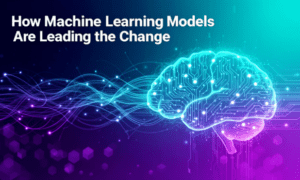Deep learning has emerged as a revolutionary technology within data science, enabling businesses to extract valuable insights from their data like never before. In the era of data-driven technology, deep learning offers businesses a competitive advantage by utilizing advanced neural networks to build intelligent applications.
As the volume of data increases, AI and ML have become indispensable tools for businesses seeking to extract meaningful insights from their data. The use of ML models has seen exponential growth in recent years, leading to significant improvements in operational efficiency and performance.
However, deploying and managing these advanced models present significant challenges for data scientists and engineers worldwide. The complexity of building and scaling these systems demands high expertise and resources.
The development process of deep learning models is now simplified with the availability of several frameworks. These frameworks empower businesses to fully realize the transformative potential of this technology and overcome the challenges of deploying and managing advanced models.
In this article, we’ll explore various Deep Learning Platforms that enable businesses to overcome the challenges of deploying and managing advanced models. These platforms help organizations harness the power of their data more effectively and solve their business challenges.
Deep Learning Platforms
Tensorflow
TensorFlow is a widely-adopted deep learning framework that facilitates the development of deep learning models through wrapper libraries. This framework supports programming languages such as Python, C++, and R.
The Google Brain team develops this versatile solution. It can be utilized across desktop and mobile platforms, making it a flexible choice for various ML initiatives.
Highlights of TensorFlow:
- Strong support for running on multiple GPUs
- Known for its complexity and steep learning curve
Torch/PyTorch
Torch is a scientific computing framework that facilitates various ML algorithms. It is a deep learning framework built on the Lua programming language and is extensively employed by prominent technology companies, including Facebook, Twitter, and Google.
Torch harnesses the power of CUDA and C/C++ libraries to expedite data processing, and it is explicitly engineered to strengthen the expansion of ML models while preserving flexibility.
Highlights of PyTorch:
- PyTorch excels at rapid prototyping.
- It strongly supports GPUs, allowing for parallel programming on multiple GPUs.
Deeplearning4j
Deeplearning4j is a Java-based deep learning library that supports other JVM languages, including Scala, Clojure, and Kotlin. Its key functionalities comprise parallel training via iterative reductions, adaptability to a microservice architecture, and distributed computing on both CPUs and GPUs.
Notably, Deeplearning4j is extensively employed as a commercial, industry-oriented, and distributed deep learning platform, featuring support for various deep network models such as Restricted Boltzmann Machines (RBM), Convolutional Neural Networks (CNN), Recurrent Neural Networks (RNN), Recursive Neural Tensor Networks (RNTN), and Long Short-Term Memory (LSTM).
Highlights of Deeplearning4j:
- Offers multi-threaded and single-threaded deep learning frameworks
- Compatible with Hadoop and Spark administration
The Microsoft Cognitive Toolkit/CNTK
The Microsoft Cognitive Toolkit, formerly recognized as CNTK, is a deep learning framework. It has gained substantial recognition for its user-friendliness and comprehensive assortment of prevalent model types tailored for server deployment.
Its open-source structure empowers users to train deep learning models that exhibit remarkable proficiency in Convolutional Neural Networks (CNNs), particularly for data types based on images, speech, and text.
Highlights of Microsoft Cognitive Toolkit/CNTK:
- Offers support for various interfaces, including Python, C++, and Command Line
- Suitable for use cases such as image, handwriting, and speech recognition
Keras
The Keras library was specifically engineered to expedite experimentation in machine learning. Keras is developed in Python and supports convolutional and recurrent neural networks, which can be seamlessly executed on popular computational frameworks, including TensorFlow and Theano.
Highlights of Keras:
- Capable of handling multiple deep learning backends.
- Incorporation of distributed training and multi-GPU parallelism features within the framework.
ONNX
ONNX, an abbreviation for Open Neural Network Exchange, is an open-source ecosystem that caters to deep learning applications and facilitates effortless cross-platform compatibility. Microsoft and Facebook jointly developed this framework and offered a comprehensive set of definitions for built-in operators, standard data types, and an expandable computation graph model.
Deep learning frameworks, including The Microsoft Cognitive Toolkit, Caffe2, MXNet, and PyTorch, natively support ONNX models. In addition to this, ONNX features built-in converters that allow the seamless conversion of models between diverse machine learning frameworks such as TensorFlow, CoreML, Keras, and Sci-kit Learn.
Highlights of ONNX:
- Allows users to select their preferred framework and inference engine for greater freedom.
- Offers runtimes and libraries that are compatible with various platforms.
Mxnet
MXNet is a high-performance deep-learning framework meticulously engineered to optimize efficiency, productivity, and flexibility. It supports various programming languages, including Python, C++, and Julia.
MXNet is among the top choices for deep learning frameworks due to its ability to perform distributed training. The framework offers close to linear scaling efficiency, which optimizes hardware usage to its maximum potential.
Highlights of Mxnet:
- Hybrid programming combines the strengths of both imperative and symbolic programming paradigms.
- It exhibits nearly linear scaling on GPU clusters, providing exceptional scalability.
Caffe
Caffe is a powerful deep-learning framework that extensively supports many programming languages, including C, C++, Python, MATLAB, and Command-Line. It has earned widespread acclaim for its remarkable processing speed, significantly contributing to its widespread adoption. Caffe’s popularity has been further strengthened by its ability to rapidly model Convolutional Neural Networks (CNNs) with exceptional proficiency.
Highlights of Caffe:
- Configuration allows for model definition without complex coding.
- Setting up and training are simplified, eliminating the need to build onto the network.
Conclusion
In conclusion, the transformative potential of deep learning and AI is rapidly reshaping the world of data-driven decision-making for businesses. With a range of frameworks available, from TensorFlow to ONNX, data scientists and engineers have access to powerful tools to streamline the development process of advanced models.
As we look ahead to 2023, the future of AI and deep learning appears bright, and businesses that embrace these technologies stand to gain a significant competitive edge. If you want to access advanced AI capabilities easily and without requiring extensive resources or expertise, Maruti Techlabs – Machine Learning Services is your solution.



































